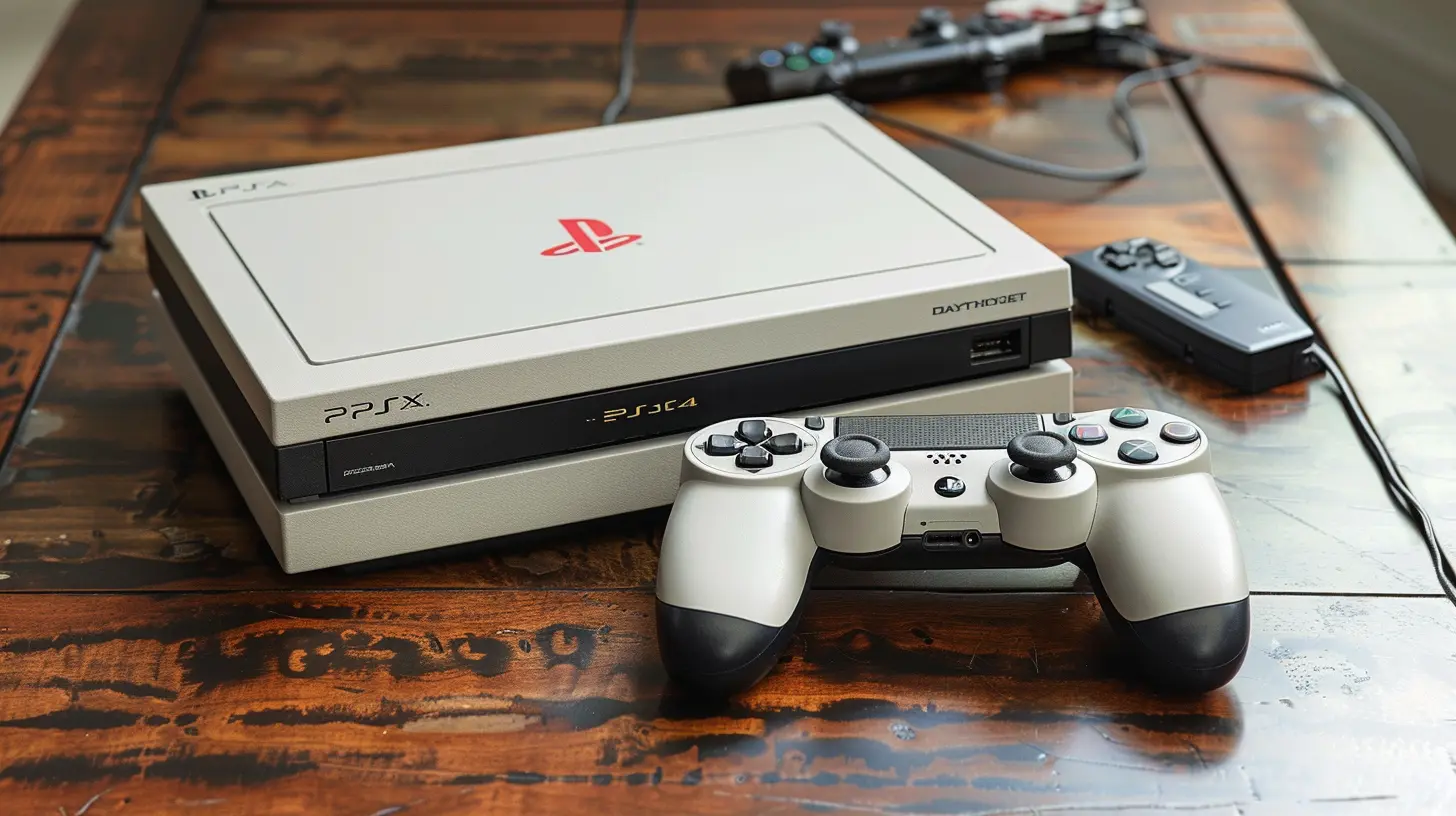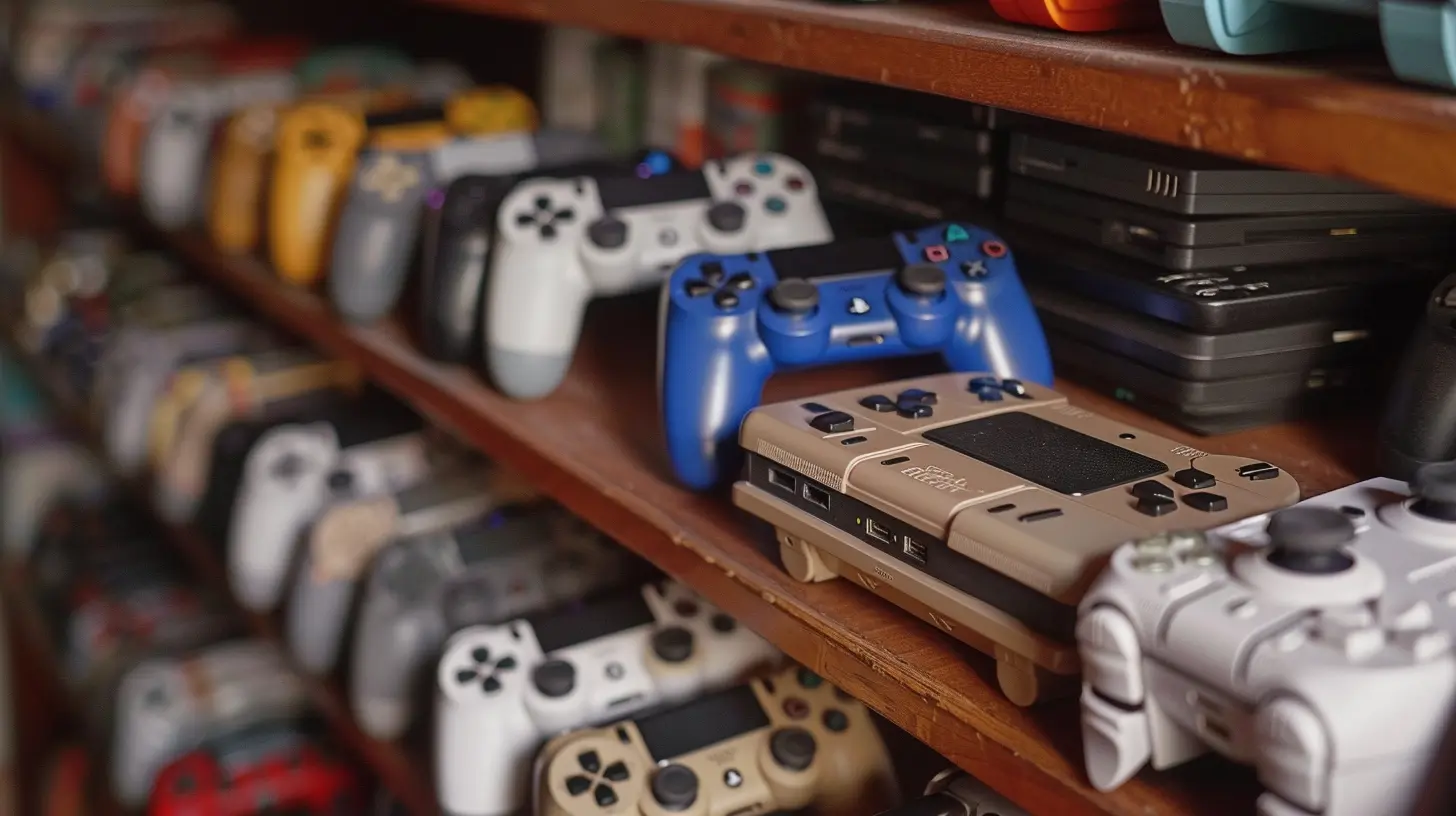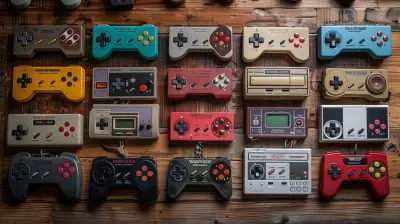Why the PlayStation’s Launch Was a Turning Point in Console History
6 October 2025
Ah, the '90s—a golden era when grunge was king, Tamagotchis were our digital pets, and the gaming world was about to be flipped on its head. Enter the PlayStation, Sony’s revolutionary console that didn’t just shuffle the deck—it threw a Joker into the mix. If you’ve ever wondered how that gray box with a lovable boot-up sound became the beating heart of gaming culture, let’s take a little stroll down memory lane. Spoiler alert: It wasn’t dumb luck; it was pure magic and a dash of rebellion. 
The Birth of a Legend: PlayStation’s Origins
First, let’s set the scene. It was the early '90s, and Nintendo and Sega were duking it out for console supremacy like heavyweight boxers. Sony? They weren’t even in the ring. But here’s the twist: Sony's entrance into the console market wasn’t exactly planned.Legend has it (and by legend, I mean actual corporate drama) that Sony initially partnered with Nintendo to create a CD-based add-on for the Super Nintendo Entertainment System (SNES). Sounds like a good idea, right? Except Nintendo pulled a fast one and went behind Sony’s back to team up with Philips instead. Ouch.
Rather than licking their wounds, Sony said, “Fine, we’ll build our own console.” And boy, did they. By December 3, 1994, the PlayStation was born in Japan, and the console world would never be the same.
Gaming with a Vision: What Made the PlayStation Different?
Where other gaming companies were playing checkers, Sony was playing chess. They didn’t just want to make a console; they wanted to redefine what gaming could feel like. The PlayStation wasn’t just a plastic box; it was a statement. Here’s why:1. CD-ROM Technology: A New Frontier
Remember when cartridges ruled the gaming world? Sure, they were reliable, but they were like trying to fit the ocean into a kiddie pool—limited space, limited possibilities. Sony’s PlayStation ditched those cartridges for CDs, and the gaming industry collectively gasped.With CDs, developers suddenly had way more space to work with. Think of it like switching from a typewriter to a laptop. Games could be bigger, better, and bolder. Need proof? Just look at hits like Final Fantasy VII, which wouldn’t have been possible on cartridges. Game-changing—literally.
2. 3D Graphics: A Glimpse into the Future
The PlayStation saw the future, and it was three-dimensional. While other consoles dabbled in 3D graphics, the PlayStation brought them front and center. Games like Crash Bandicoot and Tomb Raider didn’t just feel like games; they felt like worlds you could step into. It was like going from black-and-white films to HDTV overnight.3. Marketing Magic: Cool as Ice
Sony’s marketing was next-level genius. They didn’t just market the PlayStation as a gaming console; they marketed it as a lifestyle. Their ads screamed, "This isn’t just for kids—this is for you." They made gaming feel cool—not nerdy, not geeky, but edgy and cutting-edge. Suddenly, the high school jock and the straight-A student were both talking about Tekken. Imagine that.
The PlayStation's Game Library: A Treasure Trove of Hits
What’s a console without its games, right? The PlayStation wasn’t just known for its hardware; it was known for its absolutely killer library of titles. Let’s break it down:1. The OG Titles That Defined an Era
When the PlayStation first launched, it didn’t come to the party empty-handed. Games like Ridge Racer and Battle Arena Toshinden showed off the console’s 3D muscle. But then came the heavy-hitters—Resident Evil, Metal Gear Solid, and Gran Turismo. These weren’t just games; they were experiences.2. RPG Heaven
If you loved RPGs, the PlayStation was your paradise. This was the console that gave us Final Fantasy VII, arguably the game that made RPGs mainstream in the West. The story, the characters, the emotional gut punches—FFVII raised the bar in ways we didn’t even know were possible.3. Third-Party Games Galore
Sony played its cards right by opening the floodgates for third-party developers. Unlike Nintendo, which kept a tight grip on its software, Sony rolled out the red carpet for devs. The result? A library as diverse as a buffet. Whether you were into platformers, shooters, RPGs, or sports games, the PlayStation had something for you.
Sony’s Risky Bet: The Perfect Timing
Let’s be real—Sony took a risk entering a market dominated by Nintendo and Sega. At the time, it was like deciding to start your own coffee shop next to Starbucks. Bold move, right?But timing is everything, and Sony nailed it. Sega was stumbling with the ill-fated Sega Saturn, and Nintendo stuck with cartridges for the N64, which limited third-party support. Sony swooped in like a hawk. The PlayStation was more powerful, more accessible, and, frankly, cooler.
And it wasn’t just about tech. Sony priced the PlayStation competitively (remember that famous "$299" mic drop moment at E3 1995?), and it worked. Gamers flocked to it like moths to a flame.
A Cultural Phenomenon: The PlayStation Legacy
The PlayStation didn’t just succeed; it smashed expectations. By the time its production ended in 2006, Sony had sold over 102 million units. That’s not just big—it’s astronomical. But the PlayStation’s true impact isn’t just in the numbers; it’s in the culture it created.1. Changing the Perception of Gaming
Before the PlayStation, gaming was often seen as a niche hobby for kids and hardcore nerds. The PlayStation changed that narrative. It made gaming mainstream; it made gaming cool. Suddenly, it was okay to talk about Final Fantasy in the same breath as a blockbuster movie.2. Laying the Groundwork for Modern Consoles
The PlayStation wasn’t just a console; it was a blueprint for the future. From its focus on third-party support to its embrace of cinematic storytelling, the PlayStation set the stage for what consoles could (and should) be.The Bottom Line: A New Dawn for Gaming
It’s no exaggeration to say that the PlayStation’s launch was a turning point in console history. It wasn’t just a new piece of hardware; it was a paradigm shift. Sony didn’t just enter the gaming industry; they reshaped it. They proved that gaming wasn’t just child’s play—it was art, culture, and storytelling all rolled into one.So, the next time you hear that iconic boot-up sound, take a moment to appreciate it. That little hum wasn’t just the start of a game; it was the start of a revolution.
all images in this post were generated using AI tools
Category:
Gaming HistoryAuthor:

Brianna Reyes
Discussion
rate this article
1 comments
Summer McGillivray
The PlayStation’s launch revolutionized gaming by introducing 3D graphics, CD-ROM technology, and a diverse game library. It shifted industry focus from niche markets to mainstream appeal, setting new standards for future consoles.
October 12, 2025 at 3:52 AM

Brianna Reyes
Thank you for your insightful comment! The PlayStation truly transformed the gaming landscape, making 3D graphics and diverse game libraries accessible to a broader audience and paving the way for future console innovations.


